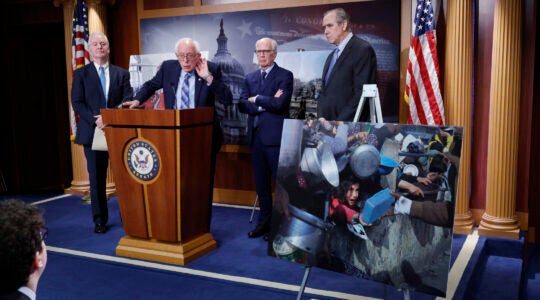WASHINGTON (JTA) — The chairs of the U.S. Senate and House of Representatives committees framing Iran sanctions say they have agreed on a package, but the White House suggests it will still press for changes.
Rep. Howard Berman (D-Calif.), the chairman of the House Foreign Affairs Committee, and Sen. Chris Dodd (D-Conn.), the chairman of the Senate Banking Committee, released a joint statement Monday outlining the new sanctions, but deferring full publication of the bill until other members of the joint House-Senate conference committee drafting the sanctions had a chance to review it.
The sanctions, as outlined, would expand third-party sanctions against entities — companies, countries and individuals — that deal with Iran’s energy sector to include the banking, insurance and shipping sectors.
They also tighten existing business bans on U.S. companies, add tort protections for states and pension plans seeking to divest from Iran, ban dealings with companies that provide Iran with the means to repress information exchanges and require certification from any company contracting to the U.S. government that it is not dealing with Iran.
The certification measure is aimed at contractors that in recent years have done at least $107 billion in business with the U.S. government while continuing to deal with Iran. By requiring certification, the measure shuts down U.S. government discretion in applying the ban.
It was unclear from the Berman-Dodd statement does how far the bill goes in otherwise restricting the president’s ability to waive the sanctions. The White House had sought broad latitude, and wanted carve-outs for nations like Russia and China that were critical to passing expanded United Nations sanctions earlier this month.
A statement from the American Israel Public Affairs Committee praising the final package suggested that the bill provided the president with a "narrow diplomatic window" to use diplomacy to isolate Iran. Otherwise, AIPAC said, "the president must impose sanctions on companies in violation" of the sanctions.
A White House statement suggested that the process had yet to come to completion.
"We will continue to work with the Congress over the coming days as it finalizes work on this important bill, and in our ongoing efforts to hold Iran accountable," it said.
The sanctions are aimed at squeezing Iran until it makes transparent its suspected nuclear weapons program.
JTA has documented Jewish history in real-time for over a century. Keep our journalism strong by joining us in supporting independent, award-winning reporting.





